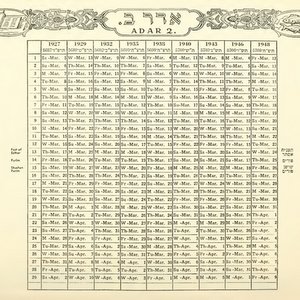Resources

This Resources section contains timelines, historical references, and a modern calendar for the feasts and festivals of the LORD.
This Date In History
The This Date In History section continues the theme of examining history as a crucial part of understanding G-d's Word and provides a 365-day-a-year look back into the historical events of Scripture, Israel, and the Jewish people.
Every day brings a new glimpse into the lives of the men and women in Biblical and Jewish history.
Today's Hebrew date is
Timelines
King Solomon, the wisest man who ever lived, said, "there is a time for every event under heaven". (Ecclesiastes 3:1)
Any serious examination of Scripture is incomplete without understanding the historical context in which Biblical events unfold. I've created these timelines as another resource to aid in studies of the Word. Because they are detailed and extensive, these timelines are best viewed in a maximized browser window on a laptop or desktop.
These interactive timelines clear the fog of the centuries and bring history and the Word into focus.

As part of The Psalm 119 Foundation, One Messianic Gentile also echoes G-d's call to holy living. Some of my efforts are focused on the study of the commandments [mitzvot] found in the Torah and determining if and how each of them can apply to believers in the body of Messiah today.
During my ongoing exploration, I developed the chart below that provides a view of possible levels of Torah observance in today's world (absent a Temple) for six categories of individuals:
- Details
- One Messianic Gentile

Note: The moedim and Jewish holidays begin at sunset the day before they are listed.
- Details
- One Messianic Gentile

The events of the ten days surrounding the Messiah's last Passover are recorded in the gospel accounts of Matthew, Mark, Luke, and John. While they might seem contradictory at first reading, a closer examination of these books reveals an intricate but discernible pattern that connects the Messiah of Israel to the appointed times of G-d: Passover, Unleavened Bread, and First Fruits.
Why is this important?
When we examine the words of the Bible and seek to understand the Divine Creator Who inspired them, we discover that the One Who made promises and covenants with our forebears is faithful to fulfill them in such an exact manner that there can be no question that He is the One, True G-d.
- Details
- One Messianic Gentile

The 613 commandments found in the Hebrew Bible were first enumerated in Moshe ben Maimon's work called the Mishneh Torah (Repetition of the Torah). Actually, these "commandments"—in Hebrew called מִצְווֹת (mitzvot)— describe 613 ways humanity can connect with the holiness of G-d. The Hebrew word mitzvot is related to the Aramaic word צוותא (tzavta) meaning "connection".
The G-d of Creation did not require some super-spiritual or religious way to approach Him. Instead, the G-d who made the entire universe took the simple and mundane things of life—waking up in the morning, the clothes we wear, the food we eat, and the daily interactions with other human beings—and enabled us to elevate them to matters of holiness and godliness so that we might connect with Him.
- Details
- One Messianic Gentile

Relationships. More than any other topic, the Bible speaks about relationships. Chapter after chapter describes the relationships between husbands and wives, between fathers and children, between one nation and another, and the critical relationship between G-d and humanity.
More than 600 verses (and over 50 whole chapters!) of Scripture are dedicated to describing family relationships. We should consider how everything we do— the decisions we make, the words we speak, and the character we exhibit— how all of these things effect the family of mankind as well as our individual and corporate relationships with our Creator.
- Details
- One Messianic Gentile

